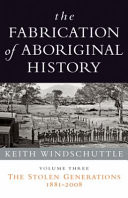Volume 3 of The Fabrication of Aboriginal History
Argues against the widely held belief that in the 20th century up to one in three Aboriginal children were forcibly removed from their parents in order to put an end to Aboriginality. In 1997, the Human Rights Commission made the most notorious accusation ever directed against Australia. It accused this country of committing genocide against the Aborigines by stealing their children. The purported intention of governments and welfare officials was to institutionalise and assimilate the children into white society and thus rid Australia of its Aboriginal people. In 2008, Prime Minister Kevin Rudd apologised to Aboriginal people for these policies. This book is based on an exhaustive examination of the archival records of child removals and of government policies and laws. It also scrutinizes the work of the historians on whom the Human Rights Commission relied. It finds the historical research that created this interpretation was shoddy and untrustworthy. Aboriginal children were never removed from their families in order to put an end to Aboriginality or, indeed, for any improper government policy or program. The small numbers of Aboriginal child removals in the twentieth century were almost all based on traditional grounds of child welfare. Most children affected had been orphaned, abandoned, destitute, neglected, malnourished or subject to various forms of domestic violence, sexual exploitation and sexual abuse. The notion that this amounted to genocide came from creative interpretations of selected evidence taken out of context by politically motivated historians. There were no Stolen Generations. NB: Volume Three is published out of sequence. Volume Two and Volume Four will be published later. pp. 656 illusts First Edition. Small closed tear in dustjacket. #0818
